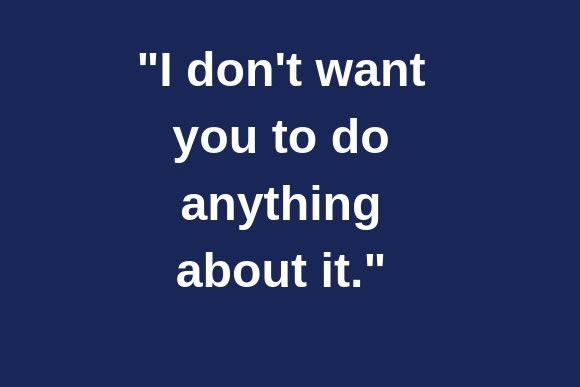The ultimate outcome is for inappropriate behaviour to stop

I am often approached by HR Managers when a conflict has arisen between staff and the complainant initially indicated that he/she did not want to do anything about it.
Often organisations have inflexible Complaints Management Policies which obliges them to quickly escalate the complaint into a formal investigation. The effect of this is that staff may feel reluctant to make a complaint in the first instance. They may feel concern that the Complaints Framework will not provide them with adequate support or they may just not trust the overall process.
I once conducted a mediation between a complainant who had been told by HR that she had to make a formal complaint. She was reluctant to do this. During the mediation, the complainant told the respondent that she had not wanted to make a formal complaint but had been told that she had to. As a result of the mediation, both parties were very relieved and the complainant indicated to me that she wished to withdraw her complaint. I advised the HR Manager of this who responded that the complaint couldn’t be withdrawn as the organisation had a legal obligation to investigate it. My response was that an investigation was now unnecessary as the matter had been resolved and a subsequent investigation would re-traumatise both staff.
Having trained as a Contact Officer at the Victorian Equal Opportunity Commission and having worked as an HR Manager for 20 years, there are many ways to respond to a staff member’s reluctance to raise issues directly with the other person, or at all.
The Commission’s view was that an effective Complaints Framework should ideally result in approximately 98% of complaints being effectively resolved through informal complaints handling processes which provides an organisation a smorgasbord of options to resolve conflict because the ultimate outcome is for inappropriate behaviour to stop. Ideally, only 2% of complaints ought to be escalated into formal complaints.
Here are some informal complaints handling options:
- Self-management: Encouraging a person to raise their concerns directly with the other person. Sometimes a person may feel that the other person may respect them more if this occurs, particularly if the other person is their Line Manager. As an HR Manager, I would offer to role-play the soon-to-be-had discussion to help the person find the language and confidence for this discussion. If this happens, I would follow-up with the person to see how the discussion went and, if it went well, I would check-in with them from time to time.
- HR Managers/Contact Officers authorised by the person to resolve the matter: This involves speaking to the perpetrator on behalf of the staff member and reiterating that there must be no subsequent negative repercussions towards the complainant as this is ‘victimisation’ – treating someone worse for having made a complaint. Victimisation attracts a fine to an organisation in its own right, irrespective of whether allegations might be subsequently upheld or not.
- Anonymous Intervention: As an HR Manager, it is often a highly effective strategy to approach the perpetrator with anonymous feedback, such as: “a number of staff are feeling uncomfortable...” Usually the perpetrator’s immediate response is: “Who said that?” My response to this is that the feedback is more important than the source.
- Independent Action: As an HR Manager, there may be circumstances when it is necessary to approach a person directly because I have become aware of inappropriate behaviour, irrespective of whether a complaint has been made or not.
- Group Training: I am often asked to provide a training session on Bullying to a large group of staff in response to inappropriate behaviour. The ‘culprits’ aren't specifically named during the training session, but everyone in the group knows why this training session is occurring and what needs to change. I call this the “I know that you know that I know that you know” approach.
- Mediation/Facilitated Discussions: When appropriate, an internal or external mediator or facilitator can effectively resolve a conflict. Having worked internally as an HR Manager, I know that sometimes it takes an outsider to an organisation to resolve a particular conflict. When the story is told to an independent 3rd party, things often get said and heard in different ways.
- Apology: Often once a perpetrator is made aware that he/she has offended or upset another, they may feel alarmed and wish to apologise immediately. This is to be encouraged. An apology goes a long way to resolving conflict.
- EAP counseling: Having the psychological and emotional support of an EAP counsellor to process the circumstances and impact of another person’s behavior goes a long way to determining how to resolve it.
A well written Complaints Management Policy should clearly outline all these informal options and HR Managers should encourage staff to pursue these in the first instance. The smorgasbord of informal options provides an organisation with flexibility to assess, in each and every situation, how to achieve the ultimate outcome – to get the inappropriate behaviour to stop.
Furthermore, unlike formal complaints, informal complaints do not have to be put in writing and anonymity may be respected. (Although, file-noting the steps taken in response to an informal complaints process is always advisable).
In my view, formal complaints handling processes involving investigations seldom resolves conflict as:
- There are limits to what an investigation can achieve
- Allegations are basically substantiated or not
- Blame (or exoneration) can leave a bad system undiscovered
- The worst sort of bullies can be excellent liars, destroying all hope of a fair process or outcome. Serial predators can be a ‘protected species’ which is usually a sign of weak leadership.
There is no legal obligation for an organisation to investigate every complaint. The law requires that complaints are treated seriously and that an organisation takes reasonable steps to address complaints. Further, the outcome or response to a complaint must be proportionate to the incident.
If the inappropriate behaviour stops through an informal complaints handling process, surely this is the ultimate and most effective reasonable step?
For effective Complaints Handling Training and Review of Complaints Handling Policy and Procedures, click here.

